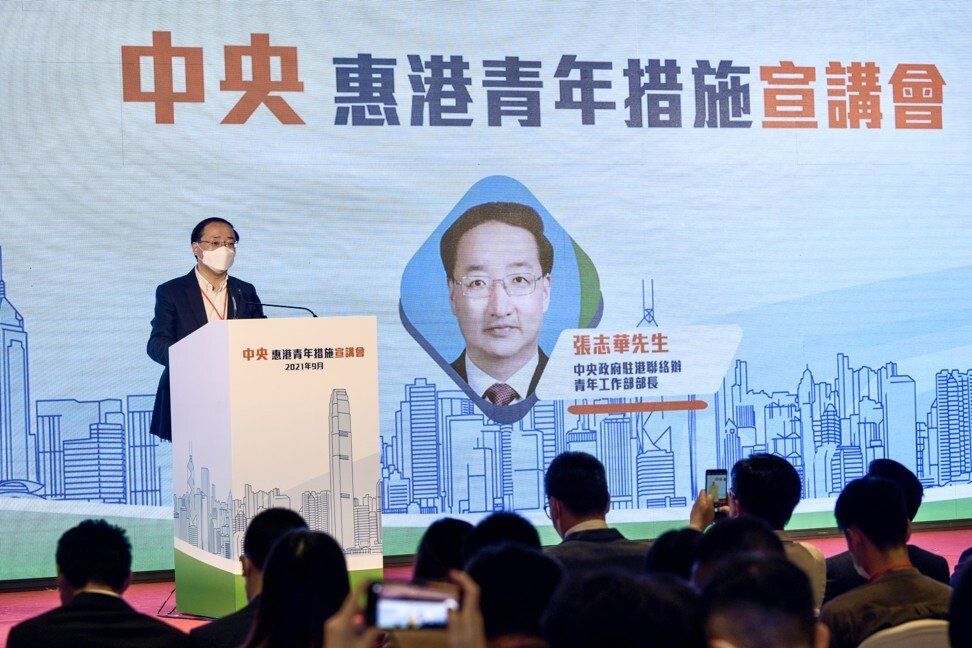Hong Kong News

Beijing vows 60,000 jobs, exchanges, internships for Hong Kong and Macau youth
Beijing has pledged to support at least 120 Hong Kong and Macau entrepreneurial projects, offering nearly 60,000 job, exchange and internship opportunities for young people from the two cities in the next five years.
The raft of measures, the central government’s latest in support of Hong Kong’s economy and residents, also grants university students in the city access to national scholarships and allows them to enter a series of high-profile technology and innovation contests held in mainland China.
Mainland officials unveiled the package on Thursday at a webinar organised by the All-China Youth Federation in Hong Kong, coming hot on the heels of the central government announcing plans to make it easier for Hong Kong accountants, lawyers, surveyors and tech professionals to work over the border.
Zhang Zhihua, youth department head of Beijing’s liaison office in Hong Kong, said the new measures were a “big package of gifts” from mainland officials.
“I hope Hong Kong’s young people will understand the nation’s development … Their biggest opportunities are in integrating with the mainland, and the Hong Kong government needs to allocate more resources to support the implementation of these measures,” he added.
Under the package of initiatives, China’s youth innovation and entrepreneur support scheme will launch a new campaign for Hong Kong and Macau, supporting at least 120 projects led by budding young entrepreneurs from the two cities over the next five years.
 Zhang Zhihua, youth department head of Beijing’s liaison office in Hong
Kong speaks at a webinar organised by the All-China Youth Federation.
Zhang Zhihua, youth department head of Beijing’s liaison office in Hong
Kong speaks at a webinar organised by the All-China Youth Federation.
Mainland authorities will provide 30,000 mainland exchange places, 15,000 internships and 12,000 job opportunities by 2025 for Hong Kong and Macau applicants.
Several major innovation and technology contests for young mainlanders and university students will be opened up to Hong Kong and Macau contestants, while China Telecom, a state-owned enterprise, will offer its scholarship programme to 20 university students in Hong Kong and 10 from Macau each year.
Separately, Guangdong authorities will create a new organisation, dedicated hotline and information handbook to support young people from Hong Kong and Macau who are based in nine mainland cities that are part of the Greater Bay Area integration project.
Nicholas Ho Lik-chi, 34, an architect and second-generation owner of Hong Kong-based architecture consultancy firm Ho & Partners Architects, said the 120 entrepreneurship projects were the most attractive.
“You can ask young people to intern in a Shanghai bank for three months, there they can observe what their bosses do, and play hard during the weekends,” he said.
“But if you open the door, give them some money, let them feel how the mainland regulations work in an entrepreneurship project, that’s a much more in-depth experience as it requires accountability, commitment and dedication.”
Ho said he hoped that rather than just asking Hong Kong and Macau youth to learn from their mistakes, authorities would provide them with mentors to teach them about mainland culture.
Social entrepreneur Raymond Mak Ka-chun, who sits on the Trade and Industry Advisory Board advising the government, agreed with Ho that the support of local start-ups could be a game changer.
For the technology contests at universities, Mak expressed hope that rather than making Hong Kong students pitch against their mainland counterparts, young people from both sides of the border should team up together.
“Mainlanders are good with hard skills such as programming, while Hong Kong people are good with soft skills such as having an international vision, so they need to form cross-university teams and interact,” he said.











